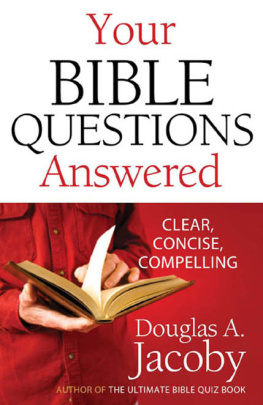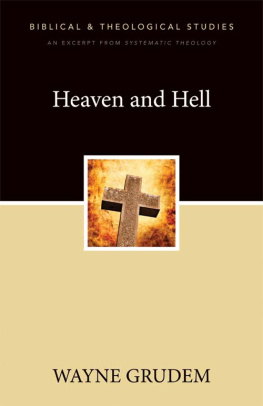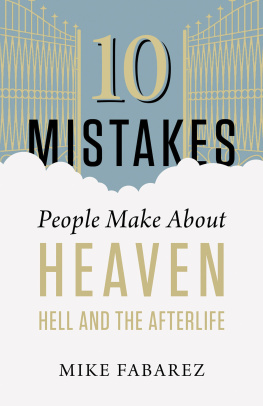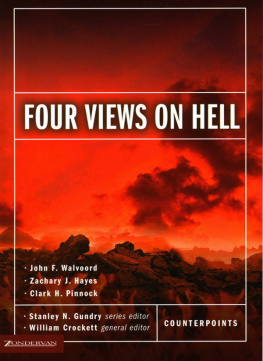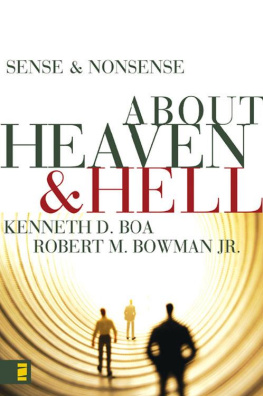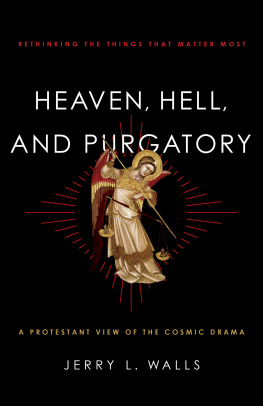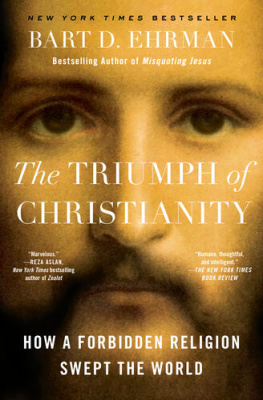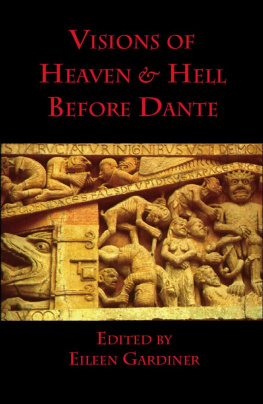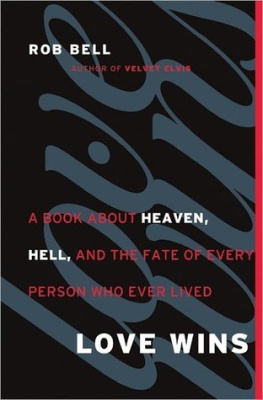

HARVEST HOUSE PUBLISHERS
EUGENE, OREGON
Unless otherwise indicated, Scriptures quotations are taken from the Holy Bible, New International Version, NIV. Copyright 1973, 1978, 1984, 2011, by Biblica, Inc. Used by permission of Zondervan. All rights reserved worldwide. www.zondervan.com
Verses marked NASB are taken from the New American Standard Bible, 1960, 1962, 1963, 1968, 1971, 1972, 1973, 1975, 1977, 1995 by The Lockman Foundation. Used by permission. (www.Lockman.org)
Verses marked KJV are taken from the King James Version of the Bible.
Cover by Dugan Design Group, Bloomington, Minnesota
The views in this book do not necessarily reflect those of the publisher.
WHATS THE TRUTH ABOUT HEAVEN AND HELL?
Copyright 2013 by Douglas A. Jacoby
Published by Harvest House Publishers
Eugene, Oregon 97402
www.harvesthousepublishers.com
Library of Congress Cataloging-in-Publication Data
Jacoby, Douglas A.
Whats the truth about heaven and hell? / Douglas Jacoby.
p. cm.
ISBN 978-0-7369-5172-2 (pbk.)
ISBN 978-0-7369-5173-9 (eBook)
1. HeavenChristianity. 2. HellChristianity. 3. Future lifeChristianity. 4. Theology, DoctrinalPopular works. I. Title.
BT846.3.J33 2013
236'.24dc23
2012041088
All rights reserved. No part of this electronic publication may be reproduced, stored in a retrieval system, distributed, or transmitted in any form or by any meanselectronic, mechanical, digital, photocopy, recording, or any otherwithout the prior written permission of publisher. The authorized purchaser has been granted a non-transferable, non-exclusive, and non-commercial right to access and view this electronic publication and agrees to do so only in accordance with the terms of use under which it was purchased or transmitted. Participation in or encouragement of piracy of copyrighted materials in violation of authors and publishers rights is strictly prohibited.
Many people have propelled me in the search for biblical truth. Our conversations, correspondence, coffees, and meals have called me higher: David Bercot, Mark Cahill, Craig Evans, Everett Ferguson, Edward Fudge, Gary Habermas, Randy Harris, Tom Jones, Gary Knutson, Craig Keener, Bob Kurka, Denis Lamoureux, Michael Licona, Jim McGuiggan, and Peter WilliamsI owe you a continuing debt of love and respect.
Other lovers of Scripture have uplifted me more than they may realize through kind words of encouragement: Francis Chan, Francis Collins, Bill Craig, Dinesh DSouza, Kenneth Kitchen, Peter Kreeft, Josh McDowell, Timothy McGrew, Charlie Moule, John Polkinghorne, Graham Stanton, John Stott, Ben Witherington, and Ravi Zacharias. I owe you too profound thanks.
To the entire Harvest House staffespecially Gene Skinner, Terry Glaspey, and Bob Hawkins Jr.as well as my unofficial editor, Joe Sciortino, I am grateful for your support and confidence in me. May it not prove to be misplaced.
Contents
If we are serious about examining what the Scriptures really say about the afterlife, we must be willing to approach the subject with an open mind. This is easier said than done. First of all, everyone interprets, whether he or she is conscious of this or not. Second, we cannot help but bring preconceptions to the discussion of the afterlife. Last, not all Scripture is intended to be read literally. Knowing the difference is key to making sense of the passages touching on the afterlife.
The unexamined faith is hardly worth believing .
Bullet, Darkness, Light
I was 18, and I was a young Christian. Like many new believers, I was burning to share my faith with everything that moved. That included the blonde from New York, who like me was a freshman at Duke University.
I had no idea she had a gun. One evening we were discussing Christianity. In mid-conversation, and without the slightest warning, she pulled it out of her handbag and shot me. Before everything went dark, I felt the bullet tearing into my chest. I clearly recall the surprisingly intense heat of this minuscule chunk of metal.
I was fadingblacknessthen utter calm. I asked out loud, Am I in heaven? As my eyes focused, I saw a light, and then a series of numbers3-5-0. What was happening? And why did I expect to be in heaven? As I came to and to my great disappointment realized I was still alive, the luminous alarm clock informed me it would soon be four a.m. It was all a dream. My question, Am I in heaven? was decisively answered by my roommate, Joe. Go back to sleep, Doug. What a dream. Would it perhaps be like this one day? What is on the other side?
I didnt have many answersId become a Christian only weeks earlier. So why did my dream take the shape it did? My assumptions about the afterlife had almost certainly come from my religious surroundings. But were they correct? In John 3:13, just three verses before the most famous Scripture in the Bible, Jesus told us, No one has ever gone into heaven except the one who came from heaventhe Son of Man. What about youwhat do you believe about heaven and hell? And if youre a believer in Christ, if a coworker asks you at lunch what you think about the topic, what scriptural basis would you have for your response?
Everyones Interested
It is indisputable that every culture has believed in life after death. Whenever I read the holy writings of the worlds religions, attend a funeral, see a sarcophagus or mummy, or walk through a graveyard, this truth is impressed on me. For millennia humans have speculated about judgment, the afterlife, and how to tip the balance in ones favor lest the final outcome prove negative. Even in countries where religion is discouraged or banned, this orientation toward the future cannot be squelched, and powerful underground movements keep faith alive. Of course the fact that faith is strong is no proof that it is right, but it doesand shouldmake the nonbeliever stop and think.
In my work I travel a lot, usually explaining the Christian faith and teaching the Bible. Last week I sat next to a fascinating woman on a flight from Mozambique to South Africa. She was well educated, fluent in many languages, and she was an atheist. We had much in common, including two countries (Sweden and Malaysia), and soon she was sharing with me her life philosophy. In short, she reasoned, Theres no need for anyone to live past age sixty.
Should they be euthanized? I asked innocently.
Of course not. But we need to consider the next generation and not be selfish, she explained.
I should probably tell you that this dear woman looked to me to be in her late fifties. Time was short, according to her philosophy. I sensed an opening. Whats your take on what happens after we die?
We decompose and become part of future generations of life.
Okay, so we become part of the next generation literally. But if the scientists are right, in a few billion years our world will be burnt up by the sun. If nothings going to last, then whats the purpose of it all? (She had no answer, although she insisted some things in her life were deeply meaningful.) Then its like existentialism? Life is ultimately absurd, so we create our own meaning? She didnt know what to say, and not because she didnt understand the question.
We had a great talk. I was able to identify several things in her life (things she had opened up to me about) that point to something beyond, to purpose and meaning. You have to admit, the evidence suggests transcendencesomething beyond this life.
And you believe in God?
I do, I responded. This world makes a lot more sense if there is a God. Im a Christian writer, and one of my books is actually on this subjectwhy belief in God makes more sense than the alternative. I have only one copy left, but its yours if you think youll read it. When we land in Johannesburg, Ill be happy to give it to you.
Next page

